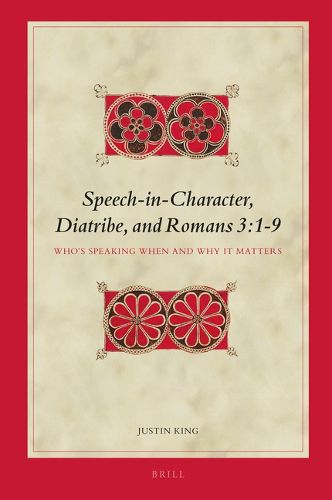Readings Newsletter
Become a Readings Member to make your shopping experience even easier.
Sign in or sign up for free!
You’re not far away from qualifying for FREE standard shipping within Australia
You’ve qualified for FREE standard shipping within Australia
The cart is loading…






In Speech-in-Character, Diatribe, and Romans 3:1-9, Justin King argues that the rhetorical skill of speech-in-character (prosopopoiia, sermocinatio, conformatio) offers a methodologically sound foundation for understanding the script of Paul’s imaginary dialogue with an interlocutor in Romans 3:1-9. King focuses on speech-in-character’s stable criterion that attributed speech should be appropriate to the characterization of the speaker. Here, speech-in-character helps to inform which voice in the dialogue speaks which lines, and the general goals of diatribe help shape how an appropriate understanding of the script is best interpreted. King’s analyses of speech-in-character, diatribe, and Romans, therefore, make independent contributions while simultaneously working together to advance scholarship on a much debated passage in one of history’s most important texts.
$9.00 standard shipping within Australia
FREE standard shipping within Australia for orders over $100.00
Express & International shipping calculated at checkout
In Speech-in-Character, Diatribe, and Romans 3:1-9, Justin King argues that the rhetorical skill of speech-in-character (prosopopoiia, sermocinatio, conformatio) offers a methodologically sound foundation for understanding the script of Paul’s imaginary dialogue with an interlocutor in Romans 3:1-9. King focuses on speech-in-character’s stable criterion that attributed speech should be appropriate to the characterization of the speaker. Here, speech-in-character helps to inform which voice in the dialogue speaks which lines, and the general goals of diatribe help shape how an appropriate understanding of the script is best interpreted. King’s analyses of speech-in-character, diatribe, and Romans, therefore, make independent contributions while simultaneously working together to advance scholarship on a much debated passage in one of history’s most important texts.